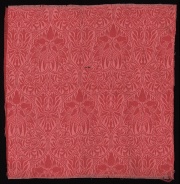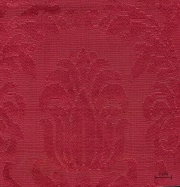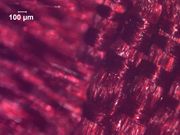Difference between revisions of "Damask"
(username removed) |
|||
| (4 intermediate revisions by 4 users not shown) | |||
| Line 1: | Line 1: | ||
| − | [[File:1976.54-SC54840.jpg|thumb|]] | + | [[File:1976.54-SC54840.jpg|thumb|Furnishing fabric<br>MFA# 1976.54]] |
== Description == | == Description == | ||
| − | A decorative textile with a woven, reversible pattern first made in Damascus in the Middle Ages. Crusaders introduced the fabric to Europe about 1100 CE and by 1300 a major center for linen damask was established in France. The Netherlands and Ireland also became major producers by the 17th century. Originally made from silk, modern damask fabrics contain one or more of the following types of fibers: [ | + | A decorative textile with a woven, reversible pattern first made in Damascus in the Middle Ages. Crusaders introduced the fabric to Europe about 1100 CE and by 1300 a major center for linen damask was established in France. The Netherlands and Ireland also became major producers by the 17th century. Originally made from silk, modern damask fabrics contain one or more of the following types of fibers: [[linen]], [[silk]], [[cotton]], [[wool]], and [[rayon fiber|rayon]]. Its elaborate patterns are produced by interspersing types of weave such as a flower in satin weave on a plain woven ground. The reverse side has a negative image of the flower in a plain weave pattern on a satin ground. Mechanical methods for weaving damask were introduced in 1835. Damask fabrics are used for upholstery, tablecloths, napkins, drapery, and book covers. |
[[File:damask_crp.jpg|thumb|Damask]] | [[File:damask_crp.jpg|thumb|Damask]] | ||
| + | [[File:damask_50X2.jpg|thumb|Damask at 50x]] | ||
== Synonyms and Related Terms == | == Synonyms and Related Terms == | ||
| − | damasco; | + | damasco; damassé; adamascado (Esp.) |
| − | == | + | ==Resources and Citations== |
| − | + | * Hermann Kuhn, ''Conservation and Restoration of Works of Art and Antiquities'', Butterworths, London, 1986 | |
| − | |||
| − | |||
| − | |||
| − | |||
| − | |||
| − | |||
| − | |||
| − | * | ||
* ''Fairchild's Dictionary of Textiles'', Phyllis G.Tortora, Robert S. Merkel (eds.), Fairchild Publications, New York City, 7th edition, 1996 | * ''Fairchild's Dictionary of Textiles'', Phyllis G.Tortora, Robert S. Merkel (eds.), Fairchild Publications, New York City, 7th edition, 1996 | ||
| − | * ''Encyclopedia Britannica'', http://www.britannica.com Comment: "Damask." | + | * ''Encyclopedia Britannica'', http://www.britannica.com Comment: "Damask." Accessed 29 Jan. 2004. |
| − | * | + | * Matt Roberts, Don Etherington, ''Bookbinding and the Conservation of Books: a Dictionary of Descriptive Terminology'', U.S. Government Printing Office, Washington DC, 1982 |
| − | * | + | * Edward Reich, Carlton J. Siegler, ''Consumer Goods: How to Know and Use Them'', American Book Company, New York City, 1937 |
| − | * Website | + | * Website: www.fabrics.net |
[[Category:Materials database]] | [[Category:Materials database]] | ||
Latest revision as of 14:16, 14 July 2022
Description
A decorative textile with a woven, reversible pattern first made in Damascus in the Middle Ages. Crusaders introduced the fabric to Europe about 1100 CE and by 1300 a major center for linen damask was established in France. The Netherlands and Ireland also became major producers by the 17th century. Originally made from silk, modern damask fabrics contain one or more of the following types of fibers: Linen, Silk, Cotton, Wool, and rayon. Its elaborate patterns are produced by interspersing types of weave such as a flower in satin weave on a plain woven ground. The reverse side has a negative image of the flower in a plain weave pattern on a satin ground. Mechanical methods for weaving damask were introduced in 1835. Damask fabrics are used for upholstery, tablecloths, napkins, drapery, and book covers.
Synonyms and Related Terms
damasco; damassé; adamascado (Esp.)
Resources and Citations
- Hermann Kuhn, Conservation and Restoration of Works of Art and Antiquities, Butterworths, London, 1986
- Fairchild's Dictionary of Textiles, Phyllis G.Tortora, Robert S. Merkel (eds.), Fairchild Publications, New York City, 7th edition, 1996
- Encyclopedia Britannica, http://www.britannica.com Comment: "Damask." Accessed 29 Jan. 2004.
- Matt Roberts, Don Etherington, Bookbinding and the Conservation of Books: a Dictionary of Descriptive Terminology, U.S. Government Printing Office, Washington DC, 1982
- Edward Reich, Carlton J. Siegler, Consumer Goods: How to Know and Use Them, American Book Company, New York City, 1937
- Website: www.fabrics.net


